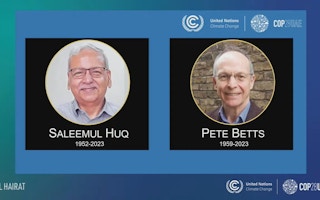The COP28 global summit, meant to find solutions for slashing carbon emissions in the coming years, kicked off with a brief look back at the lives of two people instrumental to major climate initiatives being pursued today.
To continue reading, subscribe to Eco‑Business.
There's something for everyone. We offer a range of subscription plans.
- Access our stories and receive our Insights Weekly newsletter with the free EB Member plan.
- Unlock unlimited access to our content and archive with EB Circle.
- Publish your content with EB Premium.
On Thursday, at the start of proceedings, negotiators worldwide offered tribute to professor Saleemul Huq from Bangladesh, a key voice in developing nations’ calls for “loss and damage” reparations from the Global North to recover from increasingly severe droughts, floods and storms, as well as Pete Betts, a United Kingdom official who was the European Union’s chief negotiator at the 2015 COP21 conference in France, where the Paris Agreement was adopted by nearly 200 countries.
The Paris Agreement obliged countries to pursue climate action towards keeping climate change well below 2°C. Current warming beyond pre-industrial times stands at about 1.2°C.
Huq was 71 and died from a heart attack in October. Betts, 64, succumbed to cancer in the same month. Tributes from advocates, governments and international organisations have been pouring in since.
As first speaker at the climate summit in Dubai, United Arab Emirates, outgoing conference president and Egyptian foreign affairs minister Sameh Shoukry said Betts was remembered for his “exceptional ability to build bridges, for his sense of humour and for his kindness”.
Huq, Shoukry said, dedicated his career to giving a voice to those most impacted by climate change, and will be remembered for “his endearing smile, and his calm yet fierce determination”.
Shoukry called for a moment of silence in the hall packed with global diplomats, in memory of Huq, Betts and civilians who have died in the current Gaza conflict. An intrusion into Israel from Gaza by Hamas militants in early October and the subsequent retaliation by Israel has claimed over 15,000 lives in Gaza and around 1,200 in Israel, according to the latest reports.
A UK representative offered condolences for Huq’s passing and expressed hope that he can be honoured with “a fitting outcome” from COP28 on loss and damage. Soon after, a framework of a loss and damage fund was agreed upon to standing ovation. Germany and UAE pledged US$100 million each, while the UK, United States and Japan together contributed close to another US$100 million.
The UK representative said Betts felt there hadn’t been enough effort to bridge divides in 2009, when in Copenhagen the world failed to secure a legally binding climate deal, and he “worked relentlessly to rectify that in Paris”.
A Bangladeshi diplomat said Huq was “a well-spoken gentleman loved by all” and noted his founding of a climate change research centre in his home country in 2009.
“His voice was not only for Bangladesh, it was for the vulnerable [people] of the planet,” she said.
An EU official said the bloc marked both Betts and Huq with “gratitude, respect and sadness”.
COP28 president Sultan Al Jaber called Huq a “dear friend”. Al Jaber said he personally benefited from Huq’s advice and experience, “particularly on the imperative to shift the world’s focus to the needs of adaptation”.
The COP28 summit is taking place in what is most likely the hottest year on record, according to a World Meteorological Organization report published on Thursday.
In his opening address, Al Jaber told his audience to use the next two weeks “wisely”.
“Take a no-nonsense approach with no delays. Let’s restore faith in multilateralism…let’s deliver some good news to a world that really needs it today,” he said.
But Al Jaber, head of UAE’s national oil company Adnoc, also reiterated that the role of fossil fuels must be included at the conference, a statement that will continue to irk his critics.
Apart from loss and damage funding, negotiators are also tasked to come up with a stronger political decision on fighting climate change, on the back of findings that current national ambitions are insufficient against dangerous levels of warming.
Policymakers will also try to iron out rules for international carbon markets, and make progress on a future tranche of climate financing for developing nations.












